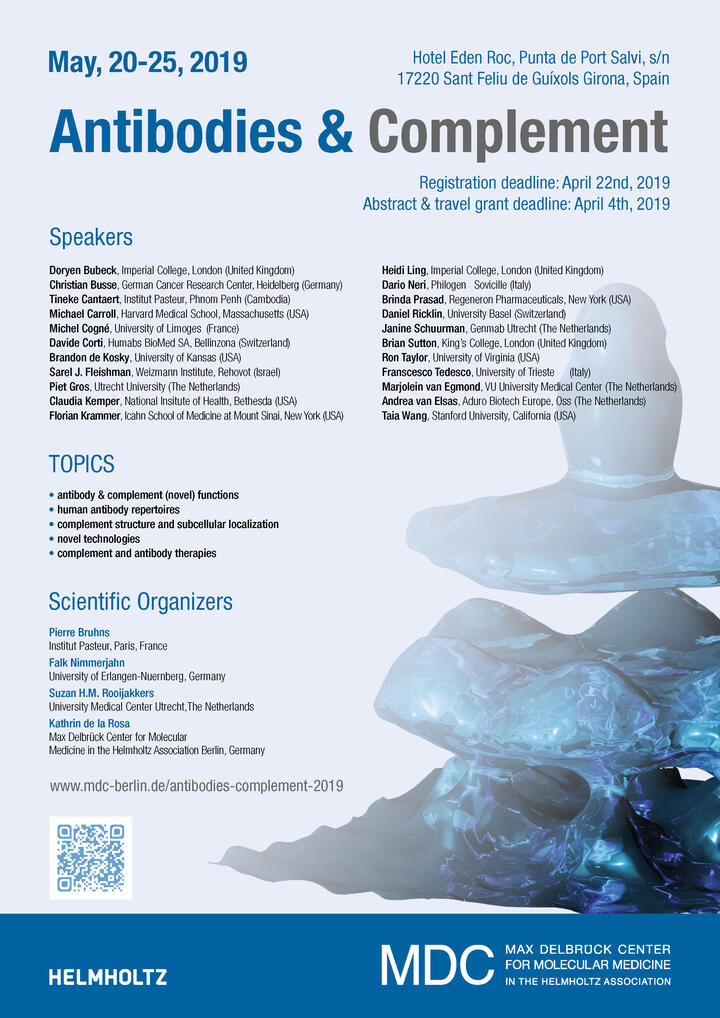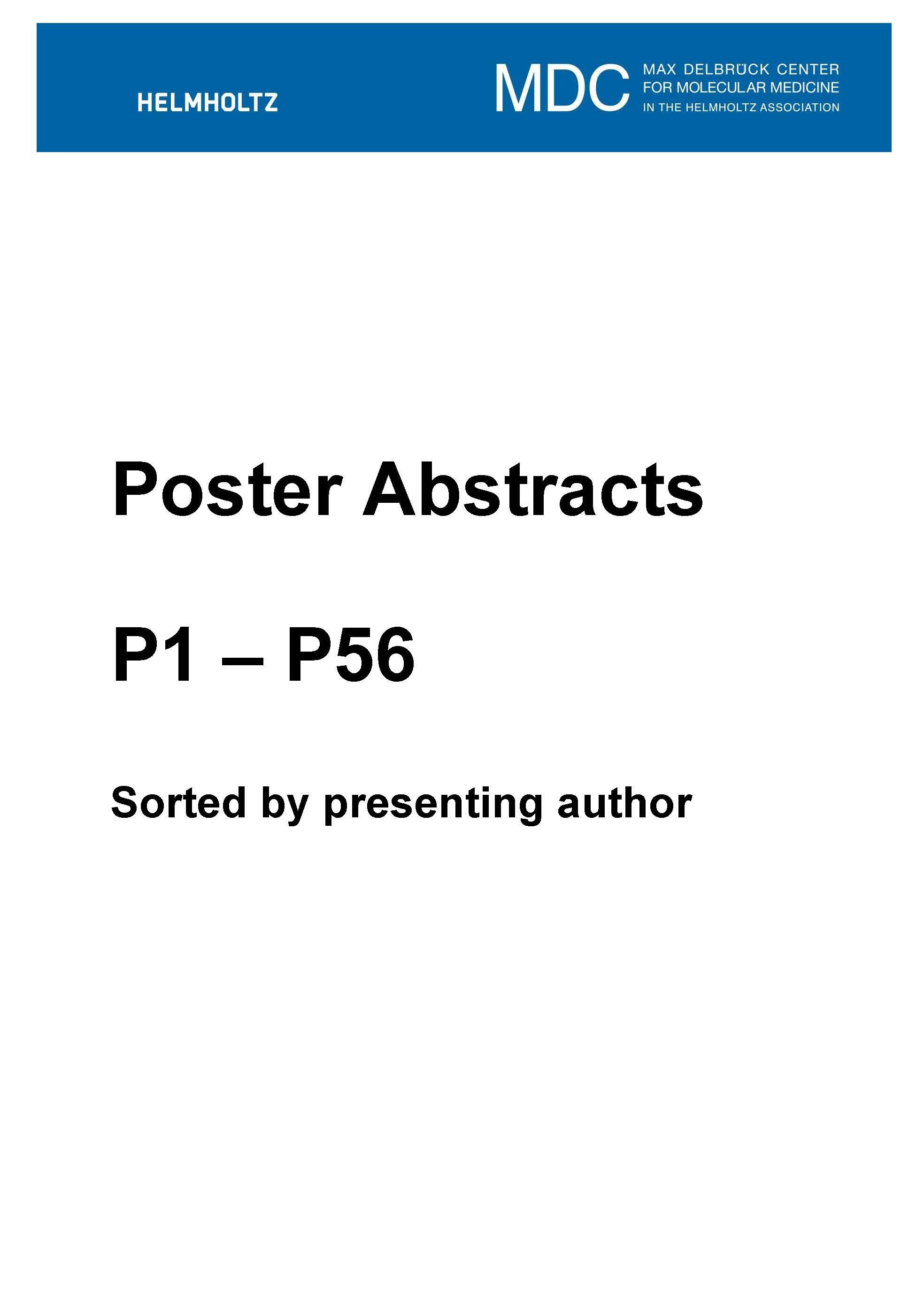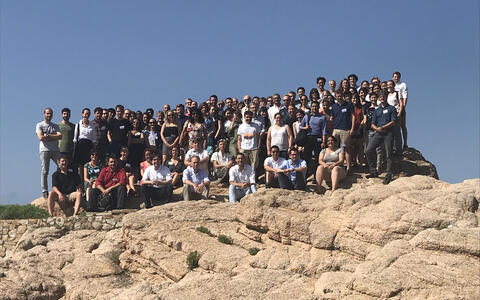Antibodies and Complement Conference
The antibody response and the complement system are major effector arms of the immune system. Both have been involved in a plethora of pathological conditions, including autoimmunity, allergy, infections and cancer. Antibodies and complement components regulate, mainly through their receptors (FcR and CR respectively) cell activation, ADCC, ADCP, CDC, CDCP, migration, survival but also, as recently described, metabolism. As the portfolio of antibody—and complement-effector function grow, high-end technological solutions are developed and novel therapeutic applications are proposed.
This 2nd conference on Antibodies & Complement will focus attention on key advances in both fields with the aim at fostering discussions between antibody experts and complement experts. Some of the critical topics to be covered include:
- antibody & complement (novel) functions
- human antibody repertoires
- complement structure and subcellular localization
- novel technologies
- complement and antibody therapies
After the success of the first edition, this second edition of conference on Antibodies & Complement should again be a forum for leaders in the field and new investigators coming from academia, industry and research institutes to discuss where the field is going and what challenges lie ahead.
Venue
Hotel Eden Roc
Punta de Port Salvi, s/n
17220 Sant Feliu de Guíxols Girona
Spain
Time
Catering
Coffee breaks; lunch and dinner buffet
Hashtag
#AntibodiesComplement19
Program
- Day 1
-
Monday, May 20, 2019
-
14:00 Registration 16:30 Welcome & Introductions by Pierre Bruhns & Kathrin de la Rosa Antibodies & Complement I
Chairs
Pierre Bruhns, Institut Pasteur, Paris, France
Kathrin de la Rosa, Max Delbrück Center for Molecular Medicine, Berlin, Germany16:40 Michael Carroll, Harvard Medical School, Massachusetts, USA
Complement in adaptive immunity17:20 Selected abstract: Christian Lehmann, University Hospital Erlangen, Germany
Antigen targeting of Fc receptors induces strong and functional relevant T cell responses in vivo independent of ITAM signaling but dependent on dendritic cell subsets17:40 Selected abstract: Kasia Kready, Institut Pasteur, Paris, France
Tracking Temporal and Spatial Affinity Maturation of Antibodies from Single-Cells in a mouse model of autoimmunity17:55 Selected abstract: Steven de Taeye, Sanquin, Amsterdam, The Netherlands
Polymorphic variant of IgG2 is less efficient in complement activation18:10 Brinda Prasad, Regeneron Pharmaceuticals, New York, USA
Enhancing Pathogen and Cellular Clearance with Bispecific C1q Antibody19:00 Welcome Reception – Networking
20:00 Dinner - Day 2
-
Tuesday, May 21, 2019
-
Antibodies & Complement II
Chairs
Suzan Rooijakkers, University Medical Center Utrecht, The Netherlands
Falk Nimmerjahn, FAU Erlangen-Nuremberg, Germany09:00 Janine Schuurman, Genmab, Utrecht, The Netherlands
Translating basic science to antibody therapeutics09:40 Selected abstract: Jürgen Strasser, University of Applied Sciences Upper Austria, Linz, Austria
The molecular pathways of IgG oligomerization and classical complement activation on antigenic surfaces10:00 Selected abstract: Ben Goldberg, Dartmouth College, Hanover, USA
Squaring in vitro complement assays with in vivo results: case studies in anti-HIV-1 complement activity10:15 Selected abstract: Seline Zwarthoff, UMC, Utrecht, The Netherlands
Proteases C1r and C1s affect binding of C1q to certain human IgG subclasses10:30 Coffee break 11:00 Heidi Ling, Imperial College, London, UK
Complement in autoimmune diseases11:40 Selected abstract: Eva Conde Garcia, Institut Pasteur, Paris, France
Anti-IL-4 and anti-IL-13 dual vaccination using Kinoid technology prevents development of allergic airway inflammation in mice12:00 Selected abstract: Cécile Bergua, IRIB Normandy, Rouen, France
In vivo pathogenicity of IgG from patients with anti-SRP or anti-HMGCR autoantibodies in immune-mediated necrotising myopathy12:15 Selected abstract: Pablo Canales Herrerias, Institut Pasteur, Paris, France
Characterizing autoantibody-producing cells in thrombocytopenic patients for secretion rate and affinity for a platelet autoantigen12:30 Lunch and social time Chairs
Pierre Bruhns, Institut Pasteur, Paris, France
Janine Schuurman, Genmab, Utrecht, The Netherlands15:00 Ron Taylor, University of Virginia, USA
The mechanism of antibody-induced complement-mediated lysis of tumor cells15:40 Selected abstract: Haoyang Zhuang, University of Florida, USA
A Novel Mechanism for Generating the Interferon Signature in Lupus: Opsonization of Dead Cells by Complement and IgM15:55 Selected abstract: Simone Oostindie, Genmab, Utrecht, The Netherlands
DuoHexaBody-CD37: a novel CD37-specific antibody that demonstrates superior complement-dependent cytotoxicity in pre-clinical B-cell malignancy models16:10 Marjolein van Egmond, VU University Medical Center Amsterdam, The Netherlands
IgA therapeutic antibodies16:50 Selected abstract: Sina Bondza, Uppsala University, Sweden
Characterization of Rituximab and C1q interactions on living cells in real-time17:05 Selected abstract: Delphine Sterlin, Institut Pasteur, Paris, France
Human IgA coat a wide range of gut commensals17:30 Poster Session I 20:00 Dinner - Day 3
-
Wednesday, May 22, 2019
-
Antibodies in infectious diseases
Chairs
Kathrin de la Rosa, Max Delbrück Center for Molecular Medicine, Berlin, Germany
Bart Bardoel, University Medical Center Utrecht, The Netherlands09:00 Davide Corti, VIR, Bellinzona, Switzerland
Novel therapeutic antibodies in infectious diseases09:40 Selected abstract: Leire Aguinagalde, UMC, Utrecht, The Netherlands
Complement-enhancing monoclonal antibodies as a therapeutic strategy against Streptococcus pneumoniae10:00 Selected abstract: Elizabeth Aitken, University of Melbourne, Australia
Identifying functional antibodies that protect pregnant women against placental malaria infection10:15 Selected abstract: Harry Schroeder, University of Alabama at Birmingham, USA
Pneumococcal vaccination elicits public B-cell repertoires and serum antibody clonotypes derived from the IgM+IgD+CD27+ memory B cell compartment10:30 Coffee break 11:00 Tineke Cantaert, Institut Pasteur, Phnom Penh, Cambodia
Protective antibody response in dengue infections11:40 Selected abstract: Timothée Bruel, Institut Pasteur, Paris, France
Complement activation at the surface of HIV-1-infected cells12:00 Selected abstract: Priscilla Kerkman, UMC, Utrecht, The Netherlands
Extracellular ATP can mediate cleavage of CD27 to generate CD27-IgD- B cells in circulation of hantavirus patients12:15 Florian Krammer Icahn School of Medicine at Mount Sinai, New York, USA
Antibody responses to conserved influenza virus epitopes12:55 Lunch and social time Chairs
Falk Nimmerjahn, FAU Erlangen-Nuremberg, Germany
Florian Krammer, Icahn School of Medicine at Mount Sinai, New York, USA18:00 Christian Busse, German Cancer Research Center, Heidelberg, Germany
Anti-malaria Abs and repertoires analysis18:40 Selected abstract: Peter Rice, UMASS, Massachusetts, USA
Complement alone drives efficacy of a chimeric anti-gonococcal monoclonal antibody19:00 Selected abstract: Timon Damelang, University of Melbourne, Australia
Importance of functional antibodies in protection of pregnant women from malaria19:15 Taia Wang, Stanford University, USA
Fucosylation on anti-dengue antibodies20:00 Dinner - Day 4
-
Thursday, May 23, 2019
-
Complement
Chairs
Suzan Rooijakkers, University Medical Center Utrecht, The Netherlands
Doryen Bubeck, Imperial College, London, UK09:00 Piet Gros, Utrecht University, The Netherlands
Antibody and complement structures09:40 Selected abstract: Ravit Netzer, Weizmann Institute of Science, Rehovot, Israel
Automated design of ultrahigh specificity protein binders10:00 Selected abstract: Rolf Spirig, CSL Behring AG, Bern, Switzerland
Inhibition of Ab-complex mediated inflammation by recombinant IgG1 Fc hexamer10:15 Selected abstract: Dennis Doorduijn, UMC, Utrecht, The Netherlands
Bacterial killing by MAC pores requires immediate assembly of C5b-710:30 Coffee break 11:00 Daniel Ricklin, University Basel, Switzerland
The Renaissance of Complement Therapeutics: Taming a Host Defense Pathway Gone Astray11:40 Selected abstract: Alex Macpherson, UCB Pharma, Slough, UK
A VHH-assisted study of the C5 inhibitory mechanisms of OmCI and RaCI11:55 Selected abstract: Immaculada Margarit Y Ros, GSK Vaccines, Siena, Italy
The Streptococcus agalactiae CIP Complement Inhibitory Protein at the interface between innate and acquired immunity12:10 Selected abstract: Dani Heesterbeek, UMC, Utrecht, The Netherlands
Disruption of Gram-negative bacteria by human serum requires complement and lysozyme12:25 Lunch and social time Chairs
Pierre Bruhns, Institut Pasteur, Paris, France
Daniel Ricklin, University Basel, Switzerland15:00 Doryen Bubeck, Imperial College, London, UK
Cryo-EM structures of MAC15:40 Claudia Kemper, National Institutes of Health, Bethesda, USA
Unexpected roles for the complosome in cell metabolism16:20 Michel Cogné, University of Limoges, France
IgG5, the new human IgG subclass17:30 Poster Session II 20:00 Dinner - Day 5
-
Friday, May 24, 2019
-
Antibody Features
Chairs
Kathrin de la Rosa, Max Delbrück Center for Molecular Medicine, Berlin, Germany
David Humphreys, UCB Pharma, Slough, UK09:00 Sarel J. Fleishman, Weizmann Institute, Israel
Computational design of antibodies09:40 Selected abstract: Jordan Dimitrov, INSERM, Paris, France
Eccentric associations: interaction of antibodies with cofactors10:00 Selected abstract: Mikhail Lebedin, MDC, Berlin, Germany
Antibody diversification through non-VDJ insertions10:15 Selected abstract: Christin Brueckner, FAU Erlangen-Nuremberg, Germany
Investigating the mechanisms of IVIg mediated resolution of autoimmune inflammation10:30 Coffee break 11:00 Andrea van Elsas, Aduro Biotech Europe, Oss, The Netherlands
Cancer immunotherapy beyond PD1: novel immunomodulatory antibodies11:40 Selected abstract: Aaron Meyer, UCLA, USA
A Multivalent Binding Model Predicts FcγR Regulation and Effector Cell-Elicited Killing12:00 Brandon de Kosky, Kansas University, USA
Interpreting antibody sequence and function on a repertoire scale12:40 Lunch and social time Chairs
Suzan Rooijakkers, University Medical Center Utrecht, The Netherlands
Falk Nimmerjahn, FAU Erlangen-Nuremberg, Germany18:00 David Humphreys, UCB Pharma, Slough, UK
Studies with Fc-multimers: hexameric Fc and on-target hexameric IgG18:40 Selected abstract: Simone Mader, LMU, Munich, Germany
In utero exposure to anti-Aquaporin-4 antibodies alters brain vasculature und results in dysfunction of spatial cognitive function19:10 Francesco Tedesco, Istituto Auxologico Italiano, Milan, Italy
Alternative roles of C1q in cancer and tissue remodeling20:00 Dinner 22:00 Social entertainment Saturday, May 25, 2019
Departure
Confirmed Speakers
-
Doryen Bubeck, Imperial College, London, UK
-
Christian Busse, German Cancer Research Center, Heidelberg, Germany
-
Tineke Cantaert, Institut Pasteur, Phnom Penh, Cambodia
-
Michael Carroll, Harvard Medical School, Massachusetts, USA
-
Michel Cogné, University of Limoges, France
-
Davide Corti, VIR, Bellinzona, Switzerland
-
Brandon de Kosky, Kansas University, USA
-
Sarel J. Fleishman, Weizmann Institute, Israel
-
Piet Gros, University Utrecht, The Netherlands
-
Claudia Kemper, National Institutes of Health, Bethesda, USA
-
Florian Krammer, Icahn School of Medicine at Mount Sinai, New York, USA
-
Heidi Ling, Imperial College, London, UK
-
Brinda Prasad, Regeneron Pharmaceuticals, New York, USA
-
Daniel Ricklin, University Basel, Switzerland
-
Janine Schuurman, Genmab, Copenhagen, Denmark
-
Ron Taylor, University of Virginia, USA
-
Francesco Tedesco, University of Trieste, Italy
-
Marjolein van Egmond, VU University Medical Center Amsterdam, The Netherlands
-
Andrea van Elsas, Aduro Biotech Europe, Oss, The Netherlands
-
Taia Wang, Stanford University, USA
Registration
Registration deadline: April 22nd, 2019
- 800 € - Scientist (single room)
- 700 € - Scientist (double room)
- 650 € - Student (double room, for single room register as scientist)
- 1000 € - Industry (single room)
- 320 € - Accompanying guest (no participation)
The registration fee includes:
- 5 nights at the Eden Roc Hotel (regardless of the registration status)
- admission to all scientific sessions and poster exhibition
- conference materials
- internet access
- breakfast, lunch, dinner, coffee breaks and refreshments
- social entertainment
Please note accompanying persons are not eligible to participate at the conference.
Abstract Submission
Extended abstract deadline: April 19th, 2019
We invite all registered participants to submit an abstract about their research. The scientific organizing committee will review all abstracts and select the most relevant contributions for short talks or poster presentation. Abstracts can only be submitted online via the "Register now" button.
Travel grants
Travel grant deadline: April 4th, 2019
Several travel grants (€500-€650) will be awarded to selected students and postdocs. Selection will be performed by the conference organizers and session chairs.
One of our partners, The Antibody Society is offering up to 7 travel grants to both recognize the research activities of promising students / postdoctoral fellows and provide educational opportunities to them. In order to be considered for this competition, you must be a student or postdoc member of The Antibody Society. If you are not already a member, you may register here for a free student or postdoc membership.
Requirements:
1. submit an abstract
2. request financial support including a support letter from your mentor
3. register for free at The Antibody Society
Organizers
Pierre Bruhns
Institut Pasteur, Paris, France
Falk Nimmerjahn
University of Erlangen-Nuernberg, Germany
Suzan H.M. Rooijakkers
University Medical Center Utrecht,
The Netherlands
Kathrin de la Rosa
Max Delbrück Center for Molecular Medicine in the Helmholtz Association
Berlin, Germany
2018 edition – Abs & Complement
Contact:
Lien-Georgina Dettmann &
Timkehet Teffera
Max Delbrück Center for Molecular Medicine in the Helmholtz Association
Berlin, Germany
antibodies@mdc-berlin.de
Supported by








